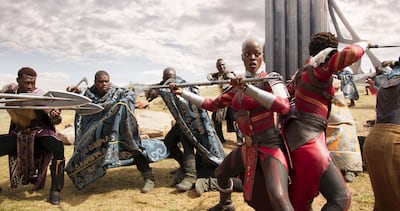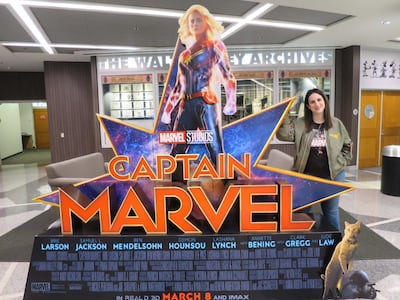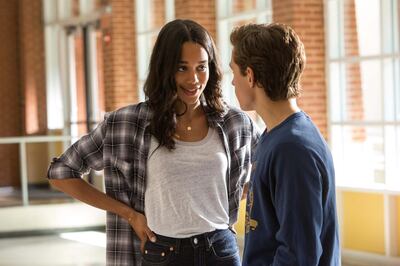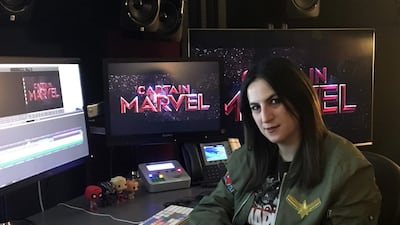As it became clear at the weekend at the Middle East Film and Comic Con, the appetite for all things in the Marvel Cinematic Universe shows no sign of abating, handy since the release of Avengers: Endgame is around the corner.
One reason for the ongoing success of the MCU is how recent films in the expanding series have tackled diversity, with a long overdue and welcome change to who can be a superhero.
But much of this progress has been down to Marvel’s secret weapon: Debbie Berman.
Berman was responsible for the female warriors in the climactic battle scene of 'Black Panther'
The South Africa editor has helped MCU films make more than $3 billion (Dh11bn) at the box office with her work on Spider-Man: Homecoming, Black Panther and Captain Marvel. While working on Black Panther, Berman persuaded director Ryan Coogler to add female Jabari warriors to the climactic battle scene.

"We had these female warriors be so spectacular throughout the entire film, and then you have the men come in and save them at the end, it felt like it really undercut what we had done to build them up," she tells The National. It wasn't an easy argument, because it meant changing what had already been done.
“It was kind of a big deal because they had already shot this massive action sequence, but we ended up picking up additional shots, and now the very first warrior to break through the force field at the end is female.”
Her own story is almost like a Hollywood script
Berman has her own tale of tenacity, ambition and courage that could be a comic book storyline itself. "I grew up in Johannesburg," she says. "When I was 11, I started making movies with my friends at the weekends, and so to work in movies just seemed like it was part of my destiny."
Born in 1978, Berman lived thousands of miles away from Hollywood and knew no one in the film industry. Nevertheless, she continued to Hulk smash all the obstacles in her way.
“I made it my job to get to know people and I met with hundreds of fellow editors,” she says. “This would be my tip to anyone who wants to work on MCU or in Hollywood: find people who believe in you and show them your enthusiasm and your passion and that will open doors. It’s a long, long road.”
That road in South Africa was not easy. But Berman smartly managed to turn obstacles into advantages. "A lot of editors in Los Angeles start their careers by working as assistants. Sometimes this can be for 10 or 20 years," she says.
"I've never assisted. Because I was in a smaller industry, I could just jump straight in to the lead role, certainly on smaller productions. I got my practise in and could utilise being in a small pond as a way to get jobs I would not have got in America."

The big leap from South Africa to Hollywood sometimes requires a pit stop in Canada
After a number of editing jobs in her homeland, Berman wanted to fulfil her dream of working on blockbuster movies and move to America. Perhaps in a movie plot, she would land in Hollywood and set about conquering the world – but in reality, she couldn't get a visa to work.
So instead, she went online to see what her options were. Upon learning of the booming film industry in Vancouver, and knowing it was slightly easier to get a visa for Canada, she decided to move there. But by slightly easier, she means: "Even that took me four years of bureaucracy and paperwork."
Arriving in Vancouver, Berman made the dispiriting discovery that even though the city was a popular filming location, most productions would bring editors in from Los Angeles for shoots, then fly them back to work in editing suites in California during the post-production period.
Refusing to be beaten, she rolled up her sleeves and set about getting any job that was available.
“I worked on an ice hockey show, which is hilarious because it doesn’t snow in South Africa, but that was my first job.”
Berman then landed work as a visual effects editor on Clint Eastwood's South African sports drama Invictus and secured an unlikely big break editing the 2008 sci-fi animation Space Chimps. "It was an animated kids' film," she says with a laugh, "but it was also a $40 million film."

'Spider-man' and 'Space Chimps': Berman's big breaks
One of the producers of Space Chimps was Barry Sonnenfeld, best known for directing the Men in Black movies, who became Berman's champion. With his encouragement, she signed with an agent in Los Angeles and was finally able to move to California.
Ten years have passed since she first decided to go to Hollywood. And Marvel was always her personal endgame. "I systematically tried to get into Marvel for many years," she says.
“It was pretty tough and there were a lot of nos, but every time I was told no, I didn’t let that get to me. I just saw no as an annoying part of the conversation I had to get through to get to the yes, and it was really a dream come true when I got my first break with Spidey.”
She wore a Marvel t-shirt to 'subliminally plant the association between me and Captain Marvel' into executives' heads
With that first gig, on the editing team of Spider-Man: Homecoming, Berman immediately began positioning herself for other jobs. And those other jobs were the real pinnacle of what was to come.
"When they announced Captain Marvel, I knew I wanted to be part of the brand's first female-led production, so I went and bought a Captain Marvel T-shirt and every single time I knew Kevin Feige [President of Marvel Film Studios] and the other executives were coming into work, I would wear that T-shirt to subliminally plant the association between me and Captain Marvel into their heads. It's not the most subtle method, but it seemed to do the trick."
But it was never just a job for Berman. Each time she went on to a new film, she was adamant about influencing underlying themes – meaning that more often than not, she wanted to champion women.
'Black Panther' isn't the only movie she's asked to be reshoot to champion female characters
“On Spidey, there were things about the character of Liz that didn’t play right to me. I got why Peter liked her, but I wasn’t buying her connection back to him. If you don’t buy their romantic connection, then there isn’t much of an impact. We ended up reshooting her interactions with Peter, and it made her character feel more genuine,” she says.
Berman believes the best way to tackle sexism in movies is to make changes rather than simply talk about what needs to be done. Her philosophy - that actions speak louder than words - guides her in life as well as with films. "The thing to do is to just bring really interesting female characters to the screen in movies that people love," she says. "And that addresses the issue without having to hit the nail on the head with it."
Berman is also an expert at keeping secrets. Because the MCU films all tie together, when editing, one eye always had to be kept on the next movie. She has completed three films that contain pivotal moments feeding into the coming Avengers: Endgame. But she refuses to give anything away.
"I honestly don't know what happens in Avengers," she says. "They would sometimes start talking about it in front of me and I would reprimand them for 'spoilers'. I work on the characters and the story as stand-alone films, and don't worry about the MCU overall story. Obviously the directors and producers are aware of any crossover implication, and they ensure things align. I'm a fan and want to watch the Avengers myself."
Avengers: Endgame is in cinemas in the UAE on April 24


